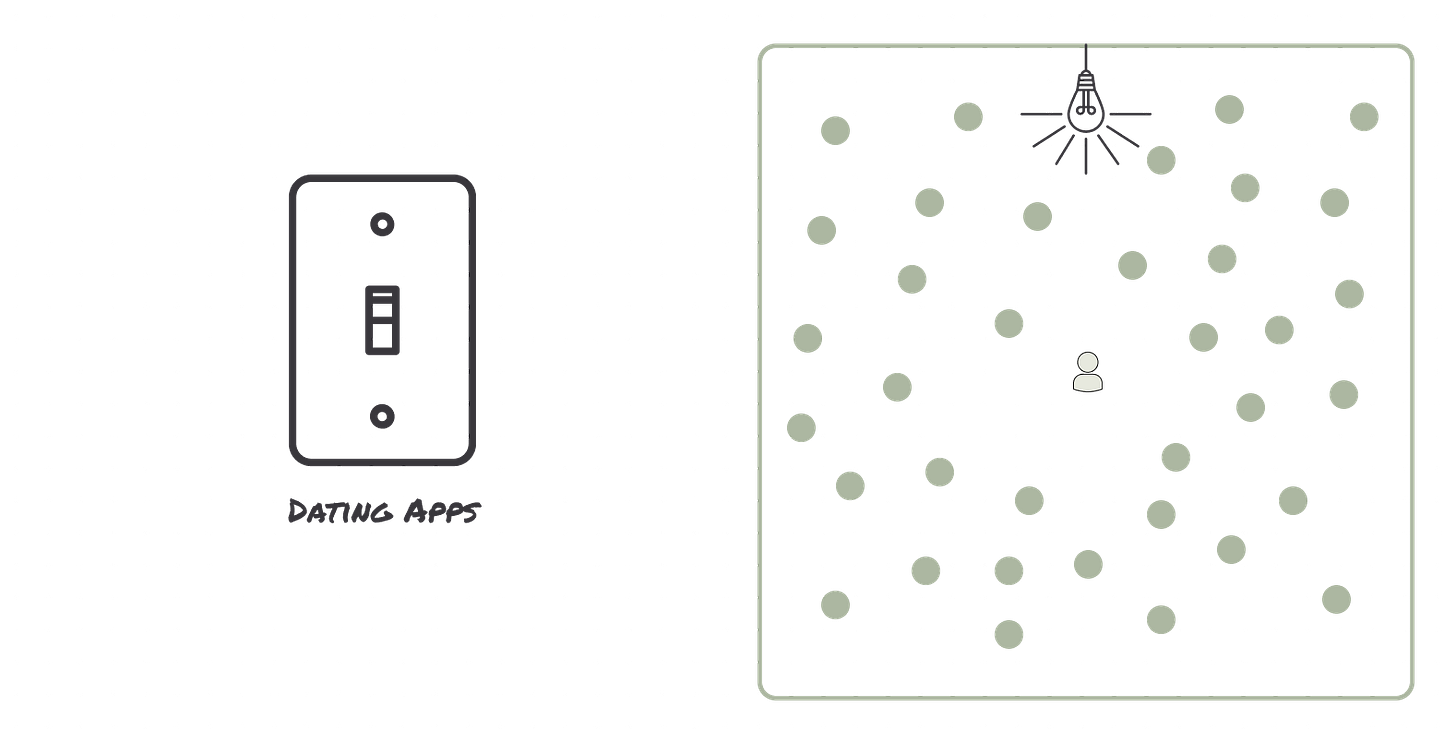Dating
Is there really an app for that?
Dating
is there really an app for that?
I’ve always been fascinated by the dating app industry ever since I learned the story of OKCupid being started by four math majors at Harvard.
As a math major myself in college at the time, I thought it was pretty cool.
All this new technology that enabled us to connect people and do it with data at scale to help people find love. Sounds great right? (I’m sure it made a great pitch deck)
It’s definitely the direction we continued to go in over the last decade plus.
The amount of couples that meet online has been on a steep increase ever since the beginning of the web and depending on the data you look at, it’s one of the largest places where relationships start today, but I don’t know if this is the idyllic future we imagined at the beginning.
What has always stuck with me, is every person I talk to who is now in a successful relationship from an app, still talks about the actual experience of being on the app as miserable.
Look, I’m not here to say that online dating is evil or there’s no hope.
It’s actually quite the opposite.
I just think the bar is on the floor right now in this industry.
How did we get here?
I think dating is often just looked at as a “matchmaking” problem, but I would rather break it down into two parts; discovery and connection.
As we entered the social era of the internet (i.e. web 2.0), I think about “fog of war” games with the maps you initially only have a limited view of what’s around you, and as you explore you expose more of the map. (anyone else play way too much Age of Empires III growing up?)
Originally our available social connections were only those who were physically around us and we had to do much more active exploring to discover more possible connections.
With social media and dating apps, we essentially exposed the whole map with one switch.
Boom. Discovery part solved, right?
You see all of your options, you pick your favorite, you connect.
We’ve clearly solved dating and brought love to everyone looking.
Well that’s this week’s ramble, thanks for reading!
Not quite.
Helping people find others through online communities has had a ton of positive benefits for people but especially in dating there’s one problem.
When we flipped that switch to expose the whole map… we also said hello to instant choice overload1.
Having options is good…until it’s not.
In general as we increase options, happiness starts going up but when we start getting overloaded with choices, we see happiness and satisfaction with those choices start going back down.
So discovery is now much easier, but we might have made it a little harder for people to form meaningful connections that they find happiness and satisfaction in.
Connecting the dots
Not only did these apps introduce the effects of choice overload to connecting, with the nature of these connections happening online, there is an important distinction of online vs. in-person communities.
Online there is usually a lower bar for entry and exit of connections.
Endless options and loose ties is not a great recipe for success.
Not only does this new structure we’ve built not help with forming meaningful connections, but in addition we also built UX patterns on top of it purely to train users to become addicted to just “one more swipe”.
Fun Fact: Did you know that the swiping UX developed by Tinder was inspired by a psychology experiment that trained pigeons to develop a repetitive behavior because they thought it was giving them a reward when the reward was in fact given randomly.2 How romantic.
tl;dr — Dating apps right now feel solely focused on exposing more dots on the map to you, but do very little to help you build connections between them.
How much are the apps to be blamed vs. what is a larger underlying societal issue.
I feel like it’s important to call out, that there are probably lots of societal issues impacting this space and people’s ability to build strong connections.
There’s a loneliness and happiness crisis going on and dating culture is definitely intertwined in that.
I think sometimes in tech we don’t talk about or take in consideration outside factors of this level when we’re building products and it shows.
Do dating apps add to the existing problem? I don’t know and I’m not trying to make a claim one way or the other, but do I think they’re actually perfectly positioned to be able to help a little? yes.
It’s okay to need a little help
We’re also coming off a huge generation of “Self Help” (from 2013 to 2019 we saw a consistent 11% YoY growth and the number of self help books in existence tripled3).
I think it’s great. I’ve read and benefited from plenty of it. We’ve built resources and places in society that people know to look towards to learn how to have healthy relationships with themselves and become self-sufficient.
However I don’t think the same is true for teaching how to start, grow, and maintain social ties in your life.
I worry sometimes we’ve over corrected and are creating a culture of self-sufficient but lonely people.
As a society we’ve traditionally relied on communities or family for modeling healthy relationships with others.
How to hold space, how to give and receive help, how to be there for others.
If you were lucky you had this modeled for you somewhere in your childhood, whether that was your family or a community you grew up in.
If you didn’t though, I don’t think there is a universal place we teach this and the resources of where to be taught are not quite as clear as what we’ve built for “self help”.
The problem is we’ve also been seeing the steady disappearance of these communities and I’m afraid that means we’ll continue to make it more likely that more and more kids do not grow up with this being modeled.
Maybe this is just me giving into the millennial urge to find a way to get closer to talking about the disappearance of third places, but I think it’s important.
This is of course much larger than the dating app industry and there’s plenty of people who are more qualified to talk about these topics and possible solutions but I don’t think we can really talk about improving dating at scale without having conversations about this too.
Back to dating apps
So again, do I think this is where we’re going to find our solution to these larger problems? Probably not.
I do think though, there are a lot of opportunities to build really meaningful products in the dating industry that do help people form meaningful connections.
So where are all the new ideas?
It feels like every person today has an idea for a dating app.
Go ahead, ask the next person you’re talking to what their idea for a dating app is. I promise they have one.
So why do we not constantly see large competitors popping up to challenge the status quo?
First, it’s not always the easiest industry to raise money in.
Andrew Chen wrote a detailed post back in 2015 explaining why VCs stay away from this space and the hurdles dating apps have.
The list is long.
The one I see take down most exciting new ideas that get off the ground is city-by-city expansion.
Not only do you have to get enough users for the platform to hold any value, but you need to do this locally, expand to more areas, and repeat over and over.
A lot of apps have tried to bypass this by just starting with a global pool of people, but I don’t know how helpful it is to match people who are thousands of miles away.
*We have seen investments in the space increase but we still are seeing hesitations from VCs to make big bets.
Making it fun
Of the new takes on a dating app, my favorite by far (that I believe only didn’t take off because of the lack of locality) was a couple years ago when four college students built Monet.
Monet was an app where users sent doodles on their phone to match with others.
You could then chat or even collaborate on doodles together.
There’s an inherent level of vulnerability we all have when physically existing in a space that just isn’t there when we’re behind a digital profile that we’ve crafted.
Introducing a sense of play like this into an interaction and structure is a great way to help people bring in vulnerability.
Plus this was just fun.
This was a great example at introducing something new that helped faciliate vulnerability and openness to connection while also making the experience itself delightful.
I’ve also been more bullish on how audio can play into this space for similar reasons.
I loved seeing Cristina Vanko 💘, the pioneer of pushing audio in this space in my opinion, launch an audio based Valentine Roulette for Valentine’s day this year.
Where do we go from here?
I think the industry is really starting to acknowledge the desire for change from its users.
We saw one of the biggest players Bumble announce they are planning on relaunching in Q2 of this year. (Although nothing instills confidence like describing what’s coming as a "compelling modern experience" that has a "stronger appeal to younger users”.)
I think it’s safe to say we’ll see the disappearance of the women messaging first feature and I would bet most changes make it way closer to Hinge with one small novelty feature for marketing, but I would love to be surprised to see something truly new!
Bumble has also has always had a toe in the IRL space, and I think they’ll double down on that as well.
Which also makes us ask, maybe the future isn’t an app?
There is definitely enthusiasm being shown for getting off the apps.
Thursday, a dating startup out of London, is the one paving the way here.
They only have their app live on Thursdays and it’s centered around actually meeting at an live event held that night in your city.
They’ve managed to nail city-by-city expansion so far, have had great marketing campaigns, and clearly invest a lot into making these events approachable and “cool”. (Not something a lot of startups working on dating IRL have found easy)
I’m excited to see where this all goes.
Short story long, I hope we build for the connection problem we have, I hope we bring more fun into the space and if we do both well, I think we help more people build happy satisfying connections that they didn’t hate the process of doing.
Free Ideas
Choice overload is reversed so after you make your profile you actually start playing matchmaker for other poeple on the app. Build a fun brand around “blind dating”An app where you cast your own season of the bachelor partnered with local venues.Love is blind but it’s actually just therapists in the other pod.
If you’re still reading, thank you for reading ramble #1.
If anything popped into your head and you want to ramble back, please reply!
Or if you know anyone who would enjoy this conversation on the dating app industry please share this post with them.
If you have suggestions for things you want rambles on, or you just want to let me know what’s been kicking around in your mind recently, shoot me an email at jessereichenstein@gmail.com.
Enjoy the week,
J
https://en.wikipedia.org/wiki/Overchoice
https://www.libraryjournal.com/story/self-help-books-fill-a-burgeoning-need#:~:text=Meanwhile%2C%20the%20number%20of%20self,2019%2C%20reaching%2018.6%20million%20volumes.
https://en.wikipedia.org/wiki/B._F._Skinner#%22'Superstition'_in_the_Pigeon%22_experiment







